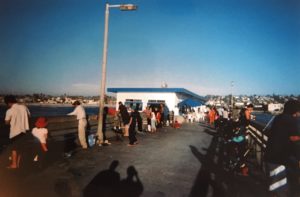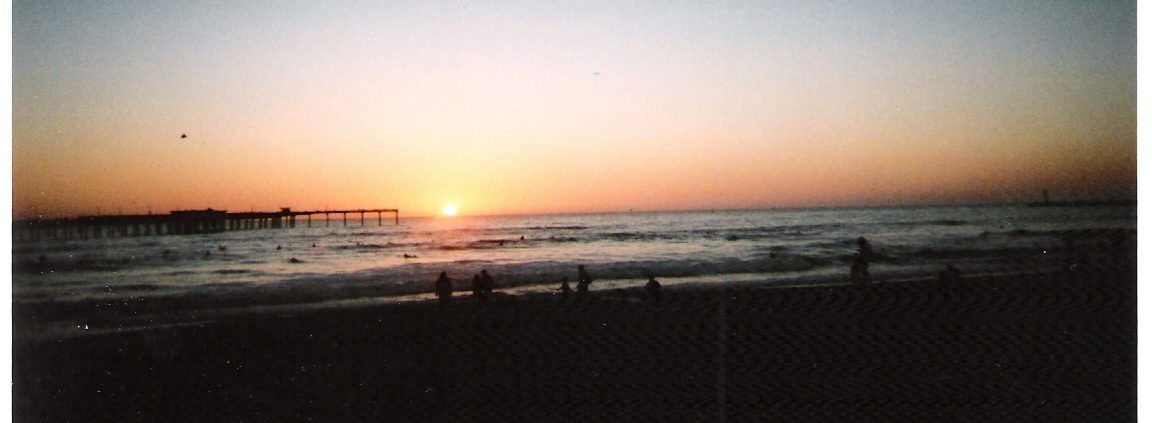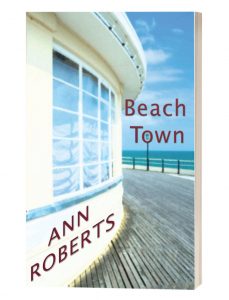Beach Town
Kira Drake lives in the closet to protect her skyrocketing movie career. Controlled by her mother and her domineering agent, Kira’s love life consists of hidden affairs and short liaisons. But then a location shoot takes her to Ocean Beach, California—an idyllic seaside town. Away from her mother and agent, Kira savors her freedom and is charmed by the liberal locals who seem to embrace everyone.
Flynn McFadden, a veterinary student and surfing instructor, quickly catches Kira’s eye, and the women fall for each other almost immediately. But when Kira’s mother and agent discover their relationship, a plot is hatched to break them apart. Kira soon realizes she must choose between her love for Flynn and the realization of her lifelong dream.
The Novel that Practically Wrote Itself
Every author has a favorite place to write and mine is the beach. I can spend hours sitting in a chair on the sand, my feet submerged beneath surface, and my journal in my hand. When our son was growing up, we journeyed to  the San Diego area many, many times for summer vacation. While I'd sit on the shore practically motionless, my wife and our son would body surf for hours. Our usual stomping ground was Pacific Beach, but one summer we journeyed further south to Ocean Beach, unable to find accommodations anywhere else. It was a grittier place with hilly neighborhoods and older homes as well as a quaint downtown featuring one of the most famous hamburger joints in the west (Hodad's). There was a pier that extended far out into the sea with a restaurant at the end—and the greatest place to watch a sunset. (Picture on the left).
the San Diego area many, many times for summer vacation. While I'd sit on the shore practically motionless, my wife and our son would body surf for hours. Our usual stomping ground was Pacific Beach, but one summer we journeyed further south to Ocean Beach, unable to find accommodations anywhere else. It was a grittier place with hilly neighborhoods and older homes as well as a quaint downtown featuring one of the most famous hamburger joints in the west (Hodad's). There was a pier that extended far out into the sea with a restaurant at the end—and the greatest place to watch a sunset. (Picture on the left).
Each night, the pier was mobbed, everyone facing west, as yellow and orange landed on the water—and disappeared. Then everyone applauded. Every night. (See the photo below.)

We also found Dog Beach, a place where dogs of all sizes frolicked and romped in the ocean and on the sand. I'll always remember the most agile whippet. His owner would flick a Frisbee, and a group of dogs that had gathered near him would bolt toward it, but as it sailed farther and farther down the shore, the man's own dog, the whippet, burst ahead of the pack, jumped up and caught the Frisbee midair. We went there every day to watch the show—the canines and their owners, many of whom were eccentric and potential characters.
The connection to Ocean Beach was so strong that by the time we left, I'd written several chapters of the book that would become Beach Town. When I got home, that connection remained and three weeks later, the entire manuscript was written. Never before had I written a novel so quickly, and I don't imagine I will again.
Chapter Two
Maureen “Mo” McFadden
Mo McFadden stood in her favorite spot—inside her restaurant, the Ocean Beach Pier Café. As the name implied, her eatery sat suspended over the Pacific Ocean at the end of the longest pier on the West Coast, facing her favorite beach town in the world, Ocean Beach. Nestled in the Point Loma area, OB was a mere ten minute drive to the San Diego airport and practically around the corner from Sea World. She was afforded a fabulous view on the occasions when Sea World staged fireworks.
Although she shared a 1950’s Spanish bungalow with her daughters and her mother on Narragansett Boulevard, she considered the pier her home, and according to the city charter, it was. Her father had bought the rights to build the pier after World War II. By the 1960s, when it was evident OB would take off as a beach town, the city filed a lawsuit to seize the pier from Seamus McFadden. They underestimated the stubborn, uneducated Irish immigrant, who eventually won the five-year lawsuit but paid the price with his health.
When her father died of a sudden heart attack the year after his legal victory, she blamed the city and closed the pier. After the huge iron gates shut out the many fishermen who enjoyed a daily haul of mackerel, they stormed city hall and demanded OB make redress with the woman who had lost her father—a woman who was a young, single mother. Her Italian immigrant husband had stayed around long enough to impregnate her twice and realize that life in a beach town was not for him.
Mo chose to ignore the gossip mongers who whispered behind her back about her scandalous personal life and focused on her business. The city council offered to rent the pier, and she used the profits to build the Ocean Beach Pier Café. Everyone was happy, and the café proved to be a popular hangout for fishermen and tourists alike. It provided a panoramic view of the sea and the town, affording her a sense of security, as though she were engulfed in the arms of the water and Ocean Beach at the same time. She kept it open from sunrise, which she had arbitrarily declared as six in the morning, until sundown, which literally meant when the giant ball of fire dropped below the horizon. Locals knew that in the summer they could count on the café remaining open until at least eight in the evening, but in winter, they knew to hurry up and eat. She shut the doors one half-hour after sundown—no exceptions.
She loved Ocean Beach, a hidden treasure unappreciated by many tourists who preferred Pacific Beach or Mission Beach, where they were surrounded by commercial retail stores and fast-food establishments. OB had refused to sell out to corporate America, rejecting their requests to land a prime spot on Newport Boulevard, the main drag and the heart of the town. She often chuckled at the reactions of unsuspecting tourists the first time they passed the rowdy crowd at the Bullfrog, or waited in line at Hodad’s, the premier hamburger joint, or gazed into Ezmerelda’s, a shop that displayed colorful bongs in its window. On a Friday night the street was packed with locals and tourists in various states of dress, many having just crawled out of the waves moments before. It wasn’t uncommon to see a bagpipe player on one corner and a zydeco band across the street.
She’d heard tourists describe OB as gritty, rough. Everyone was welcomed, whether you were a surfer, a gay runaway or a tourist—you had a place in Ocean Beach. OB was not for the pretentious, just the friendly. First-time tourists quickly assimilated with the OB townspeople, or they forever switched vacation destinations to Mission or Laguna. Such logic was fine with her. It wasn’t about the amount of visitors—it was the quality.
Yes, she thought as she gazed out into the Pacific, her life was rich. She couldn’t imagine life anywhere else and had spent all of her forty-six years living in OB, rarely trekking across the San Diego county line. She busied herself by tallying the receipts of the morning and humming along to a Celine Dion song. That woman is so talented, she thought. The receipts added up to a few hundred dollars, a typical amount for a post-Labor Day morning. She knew the flow of cash would slow now that most of the tourists were gone, and she couldn’t help but feel a little anxious when she thought of the upcoming slow winter season.
At the sound of raucous laughter, she turned to find her daughters, Flynn and Megan, burst into the café, still wet from their morning of surfing. She smiled at her girls, who were as opposite as two children could be, each containing a unique genetic mixture of their Italian and Irish heritages, two cultures that probably never should have crossed, she thought. Flynn, the red- haired spitfire, possessed a lean body made for surfing but received her father’s dark coloring. Mo had never seen an olive-skinned redhead, but God must have known Flynn would spend her life outside and couldn’t risk the sunburn. She had thought Flynn would turn to an occupation involving the sea, perhaps a marine biologist or a boat captain, but as the girl prepared for her twenty-fifth birthday, she had a year left of veterinarian school.
Megan, two years younger than Flynn, had her father’s dark hair—when it wasn’t some other crazy color—but her mother’s soft curves. Megan was far more delicate than Flynn physically, but she was her match intellectually, and her streak of stubbornness often got her into trouble. She had no interest in college and after high school she had apprenticed as a tattoo artist and found her calling. Someday she dreamed of opening her own shop, but Mo couldn’t imagine how she would ever afford it. She shook her head every time Megan appeared with new art on some part of her body, wondering what people at her retirement home would think when the girl was eighty.
“Good ride?” she asked as her daughters plopped down at a table.
“Fabulous,” Flynn said.
She nodded. It was always wonderful or fabulous. She couldn’t remember a day when surfing wasn’t the best for Flynn. She noticed Megan kept quiet. “What about you, Meg? Have a good day out?”
Megan shrugged. “It was okay, except Flynn kept dropping in on me.”
Flynn gasped. “Me? I don’t do that.”
“You certainly did. Every time I caught one, I lost it.”
The girls’ voices escalated in volume, and fortunately it was late enough in the morning so that only a few of the regulars heard their drama. The customers continued to read their newspapers or stare out at the ocean, accustomed to the banter of the colorful McFadden sisters.
“Girls, stop. I need your help.” Mo came around the counter and the three of them sat at one of the square tables. She put on her reading glasses, pulled several stapled sheets of paper from her apron and smoothed the papers out on the table.
“What is it?” Megan asked, squinting to read the small print.
“It’s a contract,” she said. “The movie people want to use the café for a few of their scenes. I’m not sure what I’m signing, and I want you girls to help me decide if I should.”
Flynn picked it up and rifled through several pages. “How much are they paying you? That’s the bottom line.”
Mo took the contract and flipped to the last page, pointing at the written amount, fifty- thousand dollars.
Flynn gasped and showed Megan, who squealed with surprise. “You’re kidding, right? There’s got to be a mistake.”
“No mistake. At first I thought it was wrong, too, so I called the attorney listed on the front, and that’s what the café is worth to them for a week.”
Flynn studied the document. “It says here that you’ll have to shut down your business, and they’ll also take over the pier. They want to bring in some vans and dressing rooms.” She smirked, and Mo could tell that she hated the idea of losing the pier so stars could primp.
“I know it will be an inconvenience, but it’s more than I’d ever make in a week. And the locals will understand. It’s perfect timing, too. I won’t lose much tourist business since they’ve already cleared out.”
Mackerel Manny turned around from the counter where he was enjoying his coffee. “I still say it’s selling out.”
Mackerel Manny was a regular, an early retiree who spent every day fishing on the OB pier. His face and arms were leathered from the sun, and his tan was a deep brown from years of leaning over the railing, fishing rod in hand. He always wore the same thing—Hawaiian shirt, chino pants, old sneakers and a fishing vest that held all of his lures and, many said, all of his secrets. No one caught more fish than Manny, who sold his catch each day to pay his rent.
“I know you don’t care about my opinion, Mo, but I’ve known you a long time, and you’re not a sellout.”
She put her hands out in question. “Why is it selling out? It seems to me that it’s an opportunity. When will fifty grand ever drop in my lap again?”
“It won’t,” Flynn said. “Take the deal, Mom. Sorry, Manny.” “I agree,” Megan said with a nod.
Manny mumbled to himself and returned to his coffee. Mo sighed deeply and carefully signed her name and initialed at the appropriate places. She put the pen down and sat back in the chair. “Okay, it’s done.”
Megan picked up the contract and stared at it. “So, what’s the name of this flick, anyway?”
“Beach Town,” she said. “Some romance piece about two people who fall in love in a beach town and then lose each other.” She put her hand to her forehead for dramatic effect.
“Who’s in it?” Manny asked.
She looked at the cover letter. “Kira Drake and Sanford Wyatt.”
Megan made retching noises and stood to leave. “I can’t stand that Sanford Wyatt. He’s the worst actor in the world. And Kira Drake’s not much better. She always comes across as so...British. I much prefer anything with Meg Ryan, like Sleepless in Seattle.”
Flynn rolled her eyes. “Kira Drake is British,” Flynn said. “I think she’s a good actress. I really liked her in The Autumn Months.”
“You just like the way she looks,” Megan teased. With a quick hug to her sister and mother, she disappeared, offering Manny a ride to the meat market. Mo returned to her duties in the café while Flynn poured herself a cup of coffee and sat at the counter.
“Is everything all right, dear?” she asked gently. “Problems with Melissa?”
Melissa was Flynn’s on-again, off-again girlfriend, and more recently they were off. Flynn gave a half smile and shrugged. “I don’t know, Mom. We didn’t see each other much this summer. I was so busy working. I think it’s over, but I really don’t care.”
Mo raised a cynical eyebrow. She knew when Flynn was brushing aside a concern. “Really?”
Flynn nodded adamantly. “Yeah, I’m not upset. I’m more preoccupied than anything else. What if I stink as a veterinarian?”
She smiled at her eldest daughter, so full of life. She didn’t know another person with as much stamina and fortitude as Flynn. She touched the red curls that she loved so much and offered her most motherly advice. “My darling, you will do wonderfully well if you are just yourself. Don’t be anything you’re not. Do your best and you’ll be fine. You’re Flynn McFadden and that’s all you need to remember.”
Flynn grinned, kissed her mother on the cheek and barreled out of the café, her energy already moving in another direction. All she ever needed were a few words of encouragement. Mo realized that Flynn required little from anyone, except a momentary reminder of her own abilities, a little cheerleading. Megan was another story, and Mo spent much of her life supporting Megan emotionally. She hoped that the girl would eventually grow up, but it hadn’t happened, so as a good parent, she waited—patiently.
She turned her attention back to the contract that sat on the table. She was glad that her daughters approved of the opportunity, but she had made up her mind the first time she read the document. The family needed that money. Although Flynn was paying for the majority of vet school, she still could use financial help, and Megan was always on the brink of poverty. The good part was that they owned everything outright—the huge house on Narragansett, which was probably worth a fortune, the café, worth a larger fortune, and the pier, which was priceless. Yet having assets did not equate to paying bills, making payroll and running a business. Yes, she had her responsibilities, and she hoped the appearance of the movie crew and the fifty thousand dollars would help lift the load from her shoulders.
